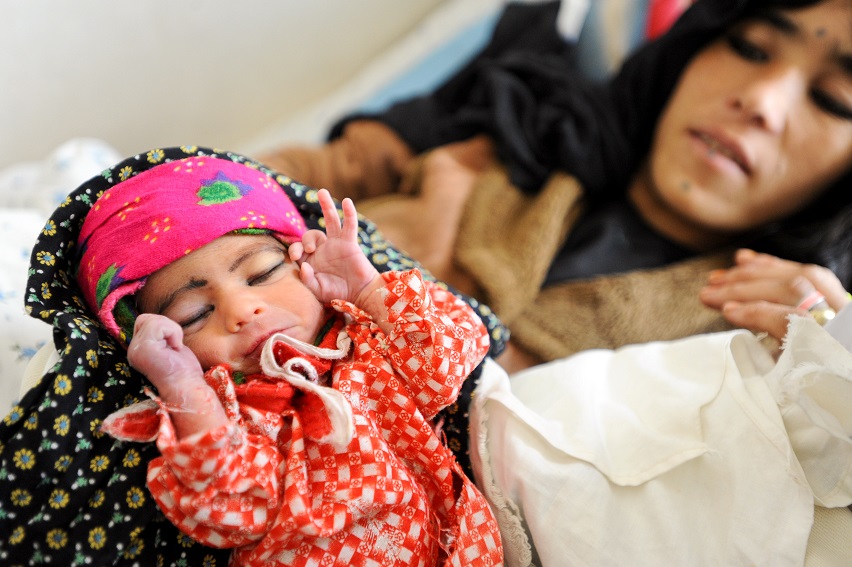 This baby of a returnee family was born safely in the Torkham border in November 2017 with the assistance of skilled midwives. Photo by David Lai / WHO Afghanistan
This baby of a returnee family was born safely in the Torkham border in November 2017 with the assistance of skilled midwives. Photo by David Lai / WHO Afghanistan
The recent wave of returnees and the large number of internally displaced people (IDPs) is posing a further challenge on already stretched health care facilities and health care professionals in Afghanistan.
On World Refugee Day 2018, WHO Representative in Afghanistan Dr Richard Peeperkorn emphasized the importance of providing effective health care to the population on the move.
Kabul, 20 June – “I examined the mother, only to find out that she had carried her dead fetus for weeks,” said Fatima, a WHO-supported midwife providing obstetric emergency care in Zaranj, a city in the region close to the border of Afghanistan and Islamic Republic of Iran.
“She suffered severe pains and fever and couldn’t do the chores around the house, until the family decided to allow her to see a health service provider,” Fatima tells.
This mother was saved, as she could access health services in time, but many women’s lives are still threatened by pregnancy and childbirth in Afghanistan. The causes of maternal deaths are many; from limited access to quality health services, to low knowledge about reproductive health, early and child marriage, multiple and consecutive pregnancies, shortages of female health care providers and other cultural barriers hindering women’s access to health services.
The recent wave of returnees and the large number of internally displaced people (IDPs) is posing a further challenge on already stretched health care facilities and health care professionals.
Return and displacement in Afghanistan is driven by insecurity and conflict, and as much as 25% of the total population have experienced displacement at one point in their lives. As of 2018, there are an estimated 800,000 undocumented and 1.4 million registered refugee Afghans in Pakistan. Islamic Republic of Iran is also hosting as many as 900 000 Afghan refugees and 1.4 million undocumented Afghans, some of whom migrate to the country for employment or are in transit to Turkey and Europe.
By June 2018, so far 15, 326 Afghans have returned from Pakistan to Afghanistan and 320 279 from Islamic Republic of Iran. In addition, estimates show that a further 700 000 people may be returning to Afghanistan in 2018, adding to the number of people in need of humanitarian assistance, including health care.
On World Refugee Day 2018, WHO representative in Afghanistan Dr Richard Peeperkorn emphasized the importance of providing effective healthcare to the population on the move. “As Health Cluster lead agency, WHO is responding to the situation its partners at Zero Point border crossings in Nangarhar, Kandahar, Herat and Nimroz provinces by providing emergency primary health care and trauma care. Particular focus is placed on providing reproductive and maternal, newborn, child and adolescent health (RMNCAH) by supporting the efforts of provincial health directorates.”
In the last 9 years, there has been notable increase in the utilization of antenatal care and skilled birth attendance among returnee population, up from 31% in 2007 to 59% in 2015.
Dr Peeperkorn reminded that the challenges ahead, however, are many. “Lack of female staff, staff turnover, gender inequality and cultural barriers affect access to health care for women and children together with insecurity, lack of roads and geographically hard-to-reach terrains.”








